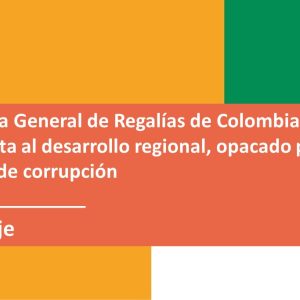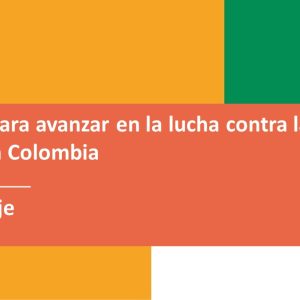PRONOUNCEMENT
We are representatives of civil society organizations working in Colombia, Guatemala, Honduras, Mexico, Peru and the Dominican Republic, gathered from March 6 to 10, in the framework of the XIII Latin American Forum on Extractive Industries of the Latin American Network on Extractive Industries (RLIE) and the meeting of the International Board of the Extractive Industries Transparency Initiative (EITI), in the city of Bogota, Colombia.
As members of the EITI – an international space made up of governments, companies and civil society from 51 countries, which seeks to make information on the extractive industry (mining, oil and gas) transparent throughout the value chain – we believe that this initiative is an opportunity to promote the broadest transparency in this sector.
Although several member countries have been implementing the new EITI standard, with varying degrees of progress, the local, regional and global demand of civil society and populations living in the areas where extractive activities are carried out cannot and should not be ignored: GREATER TRANSPARENCY AND ACCESS TO SOCIO-ENVIRONMENTAL INFORMATION IN ALL PROCESSES LINKED TO THIS INDUSTRY. In this sense, the organizations and social actors involved in this Initiative are calling for national EITI processes to include concrete commitments to include the disclosure of this type of information.
Our countries are going through a new political and economic context marked by falling international commodity prices and declining investment. Governments have responded by relaxing socio-environmental standards, criminalizing citizen protest, rolling back transparency and accountability, reducing citizens’ right to free access to information, and granting tax privileges. In addition, we are experiencing great social conflict in the extractive sector and serious acts of corruption involving private companies, high-level officials and former presidents in Latin America and the Caribbean.
Therefore, as representatives of civil society in the multi-stakeholder groups of our countries, observers and participants in the EITI processes, we endorse this statement and demand that our governments incorporate socio-environmental transparency into national processes. We believe that the inclusion of this information in national EITI reports will contribute to the reduction of social conflicts, better governance of natural resources and the promotion of human rights.
Bogotá, March 7, 2017
SIGN:
- Foro Nacional por Colombia – Civil society representative of the EITI Colombia Commission
- Transparencia por Colombia – Civil society representative of EITI Colombia Commission
- Acción Ciudadana – Civil society representative of the EITI Commission Guatemala
- Guatecívica – Civil society representative of the EITI Guatemala Commission
- Cáritas Honduras – Civil society representative of the EITI Commission Honduras
- Fundación Democracia sin Fronteras (FDsF) – Civil Society Representative of the EITI Commission Honduras
- Foro Social de la Deuda Externa y Desarrollo (FOSDEH) – Civil Society Representative of the EITI Commission Honduras
- PODER – Civil society representative of the EITI Commission Mexico
- Grupo Propuesta Ciudadana – Civil society representative of the EITI Commission Peru
- Law, Environment and Natural Resources (DAR) – Civil Society Representative of EITI Peru Commission
- Fundar, Centro de Análisis e Investigación y Red Latinoamericana sobre Industrias Extractivas – Member of the Broad Civil Society Group in EITI Mexico.
- Observatorio de Políticas Públicas de la Universidad Autónoma de Santo Domingo – Civil Society Representative of the EITI Commission Dominican Republic
- Fundación Guayacán de Energía y Medio Ambiente (GEMA) – Civil society representative of the EITI Commission of the Dominican Republic.
- Articulación Nacional Campesina – Civil society representative of EITI Commission Dominican Republic
SUPPORT
- Asociación Ambiente y Sociedad (AAS) – Colombia
- Arariwa Association – Peru
- Asociación Civil Centro de Cultura Popular Labor – Peru
- Bari Wesna Intercultural Association – Peru
- Amazonian Center for Anthropology and Practical Application (CAAAP) – Peru
- Center for the Development of the Amazonian Indigenous People (CEDIA) – Peru
- Commission on Human Rights (COMISEDH) – Peru
- CONTROLATUGOBIERNO, A. C. – Mexico
- Costa Rica Integra – Costa Rica
- Environmental Investigation Agency (EIA) / Environmental Investigation Agency
- National Space for Transparency in the Extractive Industry (ENTRE) – Dominican Republic
- Regional Federation of Indigenous Women of Ayacucho (FEREMIA) – Peru
- Ecological Forum – Peru
- Citizenship and Development Foundation (CDF) – Ecuador
- Foundation for Sustainable Development – Mexico
- GESOC, Social Management and Cooperation A.C. – Mexico
- INDYTA – El Salvador
- Institute for the Legal Defense of the Environment and Sustainable Development (IDLADS) – Peru
- Movimento pela Moralidade Pública e Cidadania – NGO Moral – Brazil
- International Platform against Impunity – Guatemala
- Peruvian Network for a Globalization with Equity (RedGE) – Peru
- Intercultural Communication Services (Servindi) – Peru
- Sonora Ciudadana AC – Mexico



